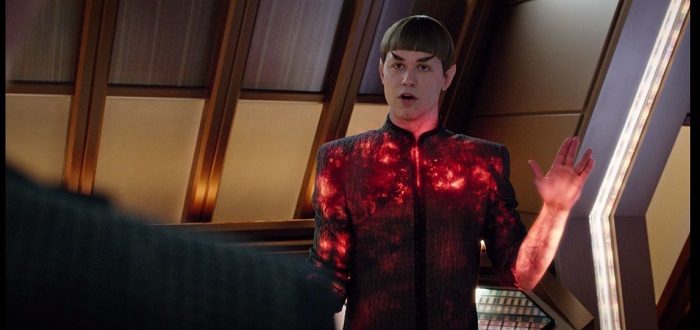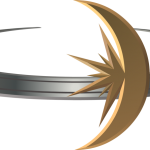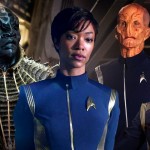Logic Extremism in Star Trek Discovery
Logic extremism is one of the many wrinkles Star Trek Discovery introduced into the broader Trek lore. It’s an idea I find, to use the language of Surak’s inheritors, entirely fascinating. A sect of Vulcans embracing extremist logic is at once a way for Disco to build on Enterprise’s stronger stories, while also giving the audience the call to action I don’t think Enterprise ever managed to sound.
The important thing to understand about Vulcans and their relationship with logic is it began as a character gimmick and then evolved into a social praxis. In short, Vulcan logic is a façade. Emotions were a weakness for TOS-era Spock and, ultimately, a disability for his father in TNG. By the time we got to DS9 and Voyager, we were implicitly seeing Vulcan logic as a veneer worn by a deeply passionate people. Enterprise, as it so often did, took that which was implicit and made it explicit. This gave us the Vulcan Reformation, a very strong three-episode arc in Enterprise’s fourth and final season. The arc told the history of how Surak established logic as a way of balancing the passionate and volatile Vulcan psyche. Note the keyword: balance.
Like all Treks, Enterprise was a product of its time. It became our first real post-9/11 Star Trek, and in doing so it tried to grapple with fear and xenophobia as recurring themes. The extent to which it found success is debatable, particularly within its first two seasons. However, season three and four laid some strong foundations for looking at revolutions and social upheaval. The work was good, but it was also preliminary. We never saw the consequences of the Vulcan Reformation beyond T’Pau telling Captain Archer that Vulcan was done meddling in Earth’s affairs. What did the true teachings of Surak do to a people who had spent a millennia living through the false orthodoxy of a deposed Vulcan High Command?
Through its creation of logic extremists, Discovery is showing the consequences that Enterprise never could, and in doing so, it is offering a classic Star Trek morality play. There’s no presenting this dissident movement as a handful of moustache twirling Space Nazis a la Enterprise’s Terra Prime. The logic extremists are terrorists and counter-revolutionaries to the Vulcan Reformation. They protest Vulcan glasnost by blowing up schools and using themselves as suicide bombers. Through the eyes of Sarek and Michael Burnham, we see them as a people threatened by a worldview that makes space for emotions and empathy.
It’s such a small idea; a notion that is missed amid endlessly tedious arguments about spore drives, set aesthetics, and Klingon hair. Yet I see this phantom antagonist as one of the ways Disco has decided to speak to both their audience and the spirit of the times. Consider how many maladjusted people invoke logic as their justification for being shitty? How many social media arguments include bad faith actors uttering some variation on an invocation of logic?
“I’m here to have a logical debate, not listen to your emotions.”
Does it sound familiar to you? It does to me. They are words I’ve seen from people I used to count as friends. People who, like the logic extremists, see empathy and compassion as a threat. They hide behind ersatz logic and use it to dismantle everything that might call their actions into question. This is the dangerous power of logic, as elucidated by Captain Janeway. Without a moral compass, one can use logic to justify anything.
When Discovery introduced suicide bombers into Star Trek’s milieu, it was not an effort to bring the grim dark into the optimism of Star Trek. Rather, Disco’s writers were doing exactly what Star Trek has always done for its audience. Trek reflects on the ills society must overcome to build a better world. At the time of this essay’s writing that better world is personified in Ensign Tilly and Lt. Commander Stamets singing Space Oddity.
The most pitch-perfect part of the logic extremism morality play is that it mobilizes canonicity, the thing Star Trek pedants endlessly invoke to keep Star Trek tethered to some imagined ideal form, as the foundation for the critique. That’s the thing about Star Trek, it’s not simply in dialogue with the audience, but it’s also iterating on itself. Captain Pike of the 1960s is an emotionally stunted rage monster. He considers quitting Starfleet to become a slave trader with the Orion Syndicate. Contemporary Pike shows vulnerability and works to earn the trust of his crew. He cultivates understanding among his officers such that a dependence on pure logic is, itself, illogical. Logic extremists then become an example of the inverse. Their presence as a counterpoint to the Federation and Starfleet shows the audience that dogmatic thinking will consume itself, but not before it takes others down with it. True to the highest-minded ideals of the original series, Discovery uses the logic extremists to ask the audience to aspire toward something better even if it can’t show us the path from one point to the next.














Pingback : Logic Extremists | Azimuth